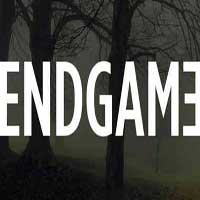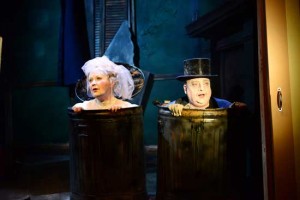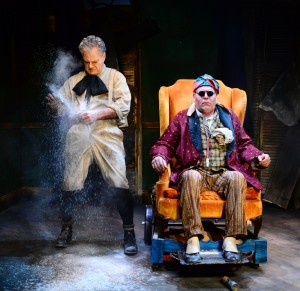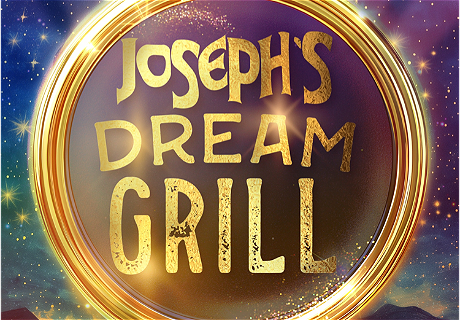
“Endgame” is both bleaker and more obscure than Samuel Beckett’s better known “Waiting for Godot” and that’s saying something! In the former, the two lead characters take consolation in each other’s friendship while waiting for Godot to appear: whoever Godot is, and whether or not he does appear or exist (in some form that characters can’t or don’t recognize) during the play, leaving us with one clearly defined if very obscure argument. That play, and its insistence on hope and comfort in the absence of a clear resolution of what its characters, at least, believe to be its narrative, can be very touching, and it is the play with which theater- goers are most likely to be familiar. It’s not nearly as clear what has happened or is happening in “Endgame,” and despite moments of humor (which this production by “The Hypocrites” certainly plays up), the tone is far less optimistic. Its sophisticated themes are never able to produce a clear argument and while that may ultimately be the point, it makes this play far less satisfying.
“Endgame” appears to be set after something catastrophic has happened to humanity, perhaps an extinction level, or near-extinction level-event, as Hamm (Hurt Ehrmann) and Clov (Brian Shaw) at least appear to have survived. Hamm is an old man: blind, immobile, and taken care of by the younger Clov who seems to be some mix of caretaker, manservant, and, most importantly, adopted son (At least that is one of the ways Hamm insists on seeing him, and we hear a lot about fathers and sons over the course of this play). Hamm has run out of things to say to Clov, and Clov keeps threatening to leave. Except for meeting Hamm’s many physical needs (he is a near complete invalid), there seems to be very little reason for him to stay; he isn’t getting a lot of the situation. But with everyone else dead, is there a really place for him to go? Instead, he stays, cares for Hamm, and listens. Among other things, to a “chronicle” which Hamm is recounting, or writing, aloud about a man who asked Hamm for food for his son who he had left sleeping three days before when he set out on his journey.
Hamm chided the man, asking him why he had left his son, and how he knew the child wasn’t dead rather than sleeping. Hamm and Clov aren’t exactly haunted—they control when they will appear—by what aren’t exactly the ghosts of Hamm’s mother Nell (Donna McGough) and father Nag (Sean Sinitski)—their costumes (Jessica Kuehnau) them look a lot more like corpses than shades, and they participate in some very corporal activities such as eating and sleeping. Nag accuses Hamm of waking him up as a child to complain about his fear and nightmares when it wasn’t really necessary (There are some strong suggestions that this may be a nightmare or psychotic delusion happening in Hamm’s head). Nags indictment, a rather strange and self-incriminating one, may point to the relationship between Hamm and Clov (Even though Hamm says he became like a father to Clov, Clov is the one now taking care of Hamm, and conversely, Hamm is giving Clov instructions about when to “bottle,” “feed,” and “wake” his father, Nag).
At one point, when Hamm entreats everyone to pray, Nag begins “Our Father…” before Hamm asks him to be silent, and complains “The bastard. He doesn’t exist.” However the only vague answer we get about fathers and sons, or perhaps human relationships in general is that “we are obliged to each other” towards the end and it just didn’t mean enough to satisfy. On a technical level, this production is a huge success.
The set (Elizabeth Bracken), a raised stage in which things appear at terrible slants, is both surreal and claustrophobic. It produces the sensation of a nightmare—which this play may well be, but the lighting (Maggie Fullilove-Nugent, served to make the ambience appropriately ambiguous (this is Beckett). It had a fantastic, almost benign, quality, but is even more dream-like. I thought the director’s (Halena Hayes) choice to use Gaelic-Irish accents was much more effective than English, Anglo-Irish, or French accents would have been (There was some French music playing before the show).
As to the acting, despite the fact that each actor gave a more than competent performance, a rather strange thing happened. Except for Kurt Ehrmann as Hamm, every actor employed an extremely physical technique in their performance. The focus was on the gestures, expressions, and movements that were often (deliberately) heavily caricatured. Each of these performances was excellent, and produced some very comic moments, but not necessarily the metaphysical angst and terrible nightmare which both the script and set suggested was happening. It also created a huge sense of incongruity because Mr. Ehrmann, whether intentionally or because much of his face was covered by glasses and confined to a chair, appeared to employ a method that was far more internal. With the consequence, that his performance seemed deeper and more genuine than those of the other actors. His character was a lot more real. This made him likable, something I didn’t really expect after his first line in which he questions whether any being in existence suffering to the same degree he was, and made us take his monologues, especially when alone on stage, a lot more seriously than we would otherwise be inclined to do. There were times he sounded wise, not merely selfish, cruel, or ridiculous. However, while this was a great effect, it never really made up for the incongruity produced, and I left with the sensation that I had scene two separate plays: one an emotive tragedy and a highly physical comedy.
Samuel Beckett’s “Endgame” is being produced by The Hypocrites at The Den Theatre which is located at 1329-1333 N. Milwaukee Avenue in Chicago. It runs through April 4, 2014 with performances Fridays and Saturday’s at 8:00 pm and Sundays at 3:00 pm with no Sunday performance April 5th. Tickets can be purchased at www.the-hypocrites.com. Regular Tickets are 28 dollars.
Parking in the area is metered and often difficult to find, so give yourself some extra time to find a space or use public transportation ( far easier). To see what others are saying, visit www.theatreinchicago.com , go to Review Round-up and click at “Endgame”.








More Stories
“Joseph and the Amazing Technicolor Dreamcoat”
“The Book Of Mormon” ( Milwaukee) reviewed by Amy Menzel
“The Joffrey Ballet’s Golden Hour” reviewed by Carol Moore